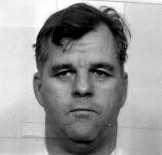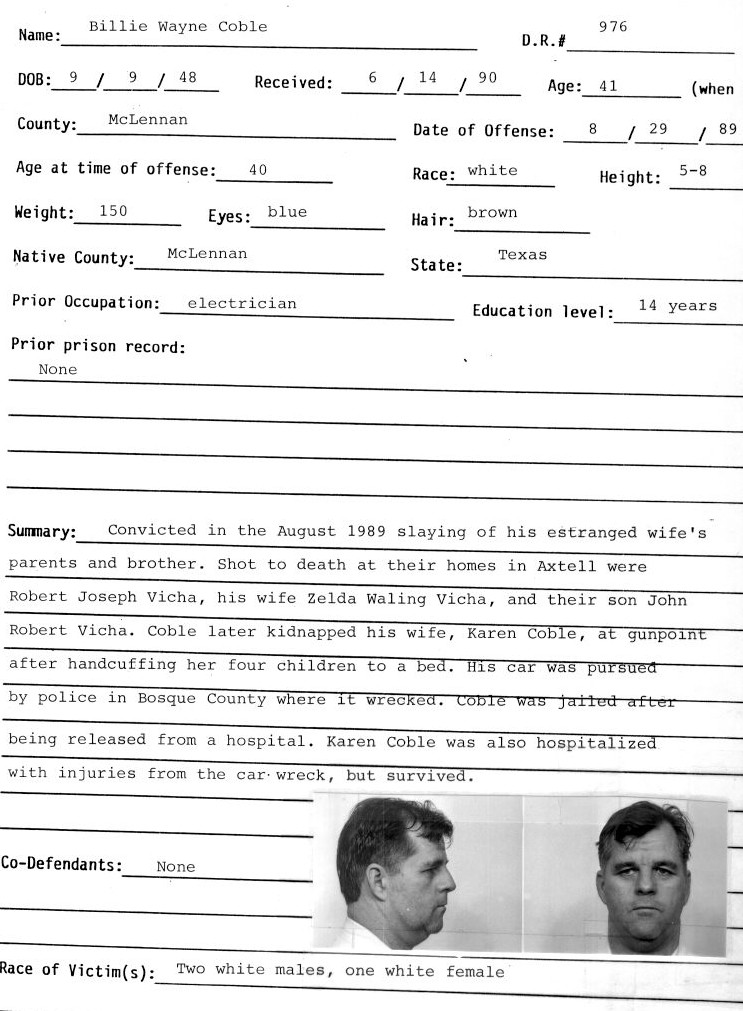Court overturns Billie Wayne Coble's death sentence
By Tommy Witherspoon - Tribune-Herald staff writer
Wednesday, August 15, 2007
A year after the 5th U.S. Circuit Court of Appeals granted a stay of
execution for Billie Wayne Coble and 18 years after he reportedly
bragged about killing three people in Axtell, the New Orleans-based
appeals court has overturned Coble's death sentence and awarded him a
new trial.
In a 28-page opinion issued Tuesday afternoon, the judges of the 5th
U.S. Circuit Court of Appeals said the two special issues that Coble's
McLennan County jury had to answer for the death penalty to be assessed
— whether he commited murder deliberately and would be a future danger
to society — were unconstitutional as they were applied to him.
The special issues posed to the jury came from instructions under the
Texas death penalty statute at the time. The 5th Circuit's ruling
reflects changes made since then that limit the scope of the death
penalty and allow a life sentence to be imposed if Texas juries believe
there is sufficient mitigating evidence to preclude the imposition of
the death penalty.
Coble, now 58, has been on death row since his 1990 conviction in the
August 1989 shooting deaths of his estranged wife's parents, Robert and
Zelda Vicha, of Axtell, and her brother, Waco police Sgt. Bobby Vicha.
The court rejected Coble's claims he was the victim of ineffective
assistance of counsel at trial. However, it reversed the death sentence
because the judges said Coble's jury was not allowed to give proper
weight to mitigating factors that could have changed their answer to the
future dangerousness issue.
Coble was represented at trial by Ken Ables, who has since died, and
Hoagie Karels.
"It has been a very long time, but finally the courts have agreed that
the instructions given, which Ken Ables and I objected to at trial, were
in error," Karels said. "And now, with a new trial and a new jury, the
jury can render a verdict proper under the facts and the correct
instructions."
Ralph Strother, now 19th State District judge, prosecuted the case with
former McLennan County District Attorney Paul Gartner, who also has
since died.
"I am just appalled and shocked and stunned and sickened at the busting
of a death penalty case on these types of technicalities," Strother said.
"I defy anyone to fully understand what they are saying. It makes no
legal sense, no moral sense.
'Might-have-beens'
"It is just clear that they didn't want to impose the death penalty in
this case. They are substituting their judgment for that of the jury and
engaging in fanciful might-have-beens or what the jury might have done
when the jury clearly had the facts before them and made the decision
based on those facts," he said.
Strother said jurors in Coble's case were given the same instructions as
jurors in Clydell Coleman's case. Those instructions were upheld and
Coleman was executed in May 1999 in the February 1989 beating death of
87-year-old Waco resident Leteisha Joe.
"Here you have this vermin who snuffed out three innocent lives like
they were nothing more than a candle, and now he may get to live the
rest of his natural life," Strother said.
Coble's appellate attorney, Richard Ellis of Mill Valley, Calif., did
not return phone messages Tuesday.
Ted Vicha, Robert Vicha's brother, and his wife, Carolyn, took news of
the court's action badly. They said there is no question of Coble's
guilt, recalling testimony from his trial of a nurse who was treating
Coble's wounds after he and his estranged wife, Karen Vicha Coble, were
injured in a car crash in Bosque County while running from police. "Have
you ever seen somebody who just killed three people?" Coble reportedly
asked her.
'This don't make sense'
"When someone brags about killing three people, how in the world can
anybody take pity on him?" Ted Vicha said. "This don't make sense one
cotton-pickin' bit. I don't understand. We have been waiting 18 years,
and it's costing taxpayers all this for nothing when he should have been
buzzard bait a long time ago."
Coble, despondent over the breakup of his third marriage, drove to
Axtell intending to convince his wife to give him another chance and to
ask her to drop kidnapping charges against him for a separate incident
after their separation, according to trial testimony.
He encountered Robert Vicha while looking for Karen, and shot the 64-year-old
in the kitchen, according to trial testimony. Coble then went to Bobby
Vicha's house, just down the lane, and ambushed him in the garage as the
police sergeant parked his car.
Bobby Vicha put up a fight, apparently diving back into his car for his
gun and wounding Coble in the right hand before Coble fatally shot him
several times, according to the testimony.
Officials say Zelda Vicha was shot to death after she arrived home later
that evening. Coble then went to Karen's home nearby, put toy handcuffs
on Bobby Vicha's son, J.R. Vicha, and his three cousins and told Karen's
three daughters to tell their mother goodbye.
He kidnapped Karen before getting into the high-speed chase and wrecking
in Bosque County, according to testimony.
J.R. Vicha is now a prosecutor on McLennan County District Attorney John
Segrest's staff.
State appeal expected
Segrest said Tuesday he expects the attorney general's office, which
represents the state in federal death penalty appeals, to ask the 5th
Circuit to reconsider its ruling.
Coble's attorneys offered testimony at trial about Coble's troubled
childhood and his traumatic experiences in combat while in Vietnam.
5th Circuit Judge Emilio M. Garza wrote that the jury might have placed
more relevance on those experiences if given the opportunity by the
wording of the special issues.
"With respect to his mental illness, there was at least some evidence
introduced at Coble's trial that his post-traumatic stress and bipolar
disorders were amenable to treatment," Garza wrote. "Based on this
evidence, the jury might have concluded that Coble, if properly treated,
would be less likely to commit criminal acts constituting a continuing
threat to society.
"Similarly, the jury might have reasoned that as Coble aged and became
more chronologically removed from his difficult childhood and traumatic
experiences in Vietnam, his troubled background would exercise a lesser
degree of influence over his actions, thereby rendering him less of a
future danger."


